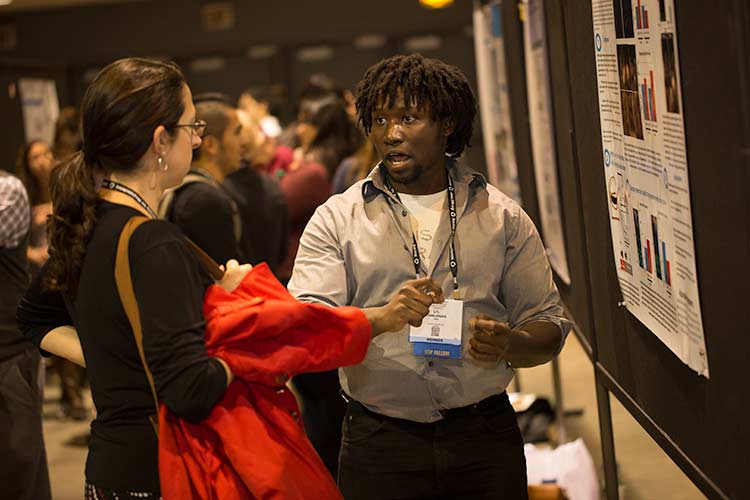
Message From SfN President Hollis Cline: Responsible Animal Research

As neuroscientists, we strive to understand the brain, the most complex biological structure in the known universe, in both health and disease. While driven by curiosity and wonder, our efforts are also fueled by the terrible toll that diseases of the brain exact on society — an estimated 1.5 billion people worldwide suffer from a neurological or psychiatric disorder or disease. Over several decades our research has produced many treatment advances, including for Parkinson’s disease, multiple sclerosis, people who’ve lost limbs and those who suffer from mental illness. The fundamental underpinning of all of these advances is necessary, responsible animal research.
Over the past few months, decisions by government bodies in the U.S. and around the world have provided openings for animal rights extremists to call into question the need for animal research. For example, NIH decided to close its primate facility in Poolesville, Md. According to NIH officials, this was a cost-saving measure, not a repudiation of nonhuman primate research as some have suggested. More recently, prompted by congressional inquiries, NIH announced it would convene a panel to review the ethical policies and procedures associated with the conduct of research involving nonhuman primates. In Australia, a senator introduced legislation to ban the import of nonhuman primates for medical research.
The clearly stated goal of animal rights extremists is to end all animal research, and they have undertaken a very real effort to do so. However, this would have immediate and dire consequences for society as we would fail to realize continued progress in understanding the brain and in developing new treatments for brain diseases. As a community of scientists, SfN needs to fully support the use of appropriate animal models, which are essential to advancing the understanding of the brain and nervous system.
All of us pursue our own avenues for exploring the nervous system, and our work encompasses everything from studying the microbiome to research with nonhuman primates. These many pathways provide different experimental approaches and a variety of experimental animals that can give us optimal insight into brain function in health and disease. We recognize the tremendous value of work in simpler animal systems such as the nematode C. elegans and the fruit fly, for example. Nearly everything we know about the genes that regulate cell death in the nervous system arose because of studies in C. elegans. We have generated and tested hypotheses in the worm and then extended them in other systems to learn the positive role that cell death plays in development and the negative role that it plays in degeneration. Similarly, because work in fruit flies allows us to easily and cheaply create mutants and measure behavior, we have uncovered genetic mutations that interfere with learning. Most of the basic information that we now know about the biochemistry of learning originated in fruit flies.
Work in more complex animals such as rodents allows us to build on the knowledge obtained from simpler systems, like flies and worms, and see whether they might extend to humans. For example, 20 years later, we are finding that humans with learning difficulties have mutations in the same genes identified in fruit flies.
New tools and methods enable us to carry out better experiments in animal models so that we can gain more knowledge. We use animals only when we have to. Experiments in nonhuman primates continue to be important because, other than studying humans, they are the best way to learn about human brain development, maternal-child interactions, and capabilities that are unique to primates, such as sophisticated cognitive abilities.
As scientists, ensuring the welfare of animals in research is paramount. We want to take the best care of our animals because we care about them and because we cannot effectively and reliably learn about the healthy brain or specific diseases if animals are stressed or sick. A multitude of laws and regulations are in place in the U.S. and other countries to ensure that animals used in research are treated humanely. Research institutions employ animal care and use committees to review every research protocol that uses even a single animal. As researchers, we endorse regulations that ensure the welfare of animals in research. However, animal rights activists have attempted to tinker with regulatory systems so that they become overly burdensome and increase costs without affecting the humane treatment of animals. This stymies research advances. Instead of arbitrary and expensive requirements, animal welfare regulations should focus on the objective, best care for animals.
Animal rights extremists intent upon stopping vital experiments have attacked animal research facilities, setting animals loose and destroying years of research. Not only have they have targeted institutions where animal research is conducted but individual researchers as well. Animal rights extremists have targeted researchers and their families in both professional and personal spheres. Whether it’s “fishing expeditions” through Freedom of Information Act requests or harassing researchers and their families at home, some extremists overstep the boundaries of civil debate in their efforts to undermine our work by spreading fear and making the conduct of research unpleasant enough that researchers decide it isn’t worth it.
In order to prevent researchers from abandoning important work that will lead to new medicines for treating diseases and disorders of the brain, there is a critical role for institutions to play in assuring investigators that they will protect against activist objections. SfN provides such resources for institutions and investigators facing such opposition.
NIH Director Francis Collins told scientists at Neuroscience 2015 that, “We have to continually make the case for how valuable it has been to study animals in order to learn almost everything we know about how biology works.” The challenge to animal research today is urgent and requires that the scientific community dedicate its time and energy to advancing public education and dialogue on these issues. Nothing less than the future of research is at stake.


















